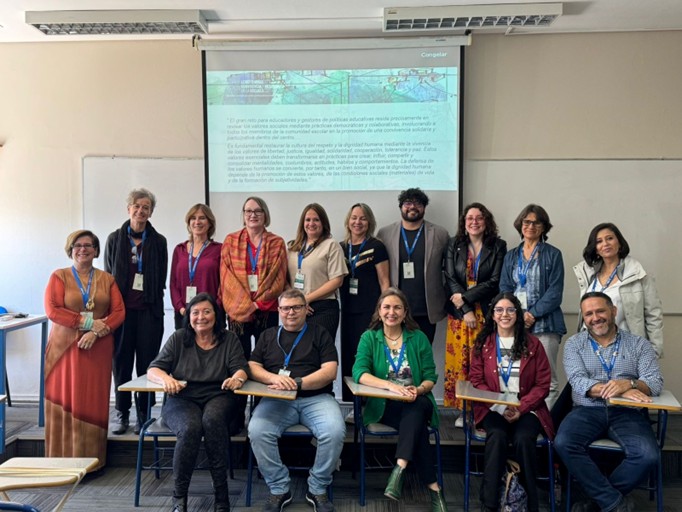The Coalition at the X World Congress on Convivencia and School Violence, Chile
At the 10th World Congress on Convivencia, Climate and Violence in Schools, held in Valparaíso, Chile, the Latin American Hub led three spaces for dialogue, reflection, and knowledge sharing on VAC prevention, inclusive education and socioemotional well-being in school settings.
The World Congress on Convivencia, Climate and Violence in Schools is a leading international forum that brings together researchers, educators, and policymakers committed to promoting peaceful school environments and preventing violence in educational settings. Organized by the International Observatory on School Climate and Violence Prevention, the 10th edition (X Congress) was hosted by the Pontificia Universidad Católica de Valparaíso in collaboration with seven Chilean universities. The Congress has become a key regional and global space for advancing dialogue, research, and policy on creating safe, inclusive, and equitable learning environments.
The event provided an ideal opportunity to showcase regional efforts by the Coalition in Latin America to strengthen connection between research, practice, and policy to prevent VAC in and through schools.
In Latin America, the term convivencia escolar—roughly translated as “school coexistence”—is widely used to study and foster school life beyond academic achievement. While often compared to the English concept of school climate, convivencia carries a distinct meaning: it views living together as both a process and an educational goal in itself—something that must be learned, practiced, and cultivated.
International Seminar “Gender and Diversities in Educational Contexts: Implications for Learning, Interpersonal Relationships, and Well-being”
Organized by the Institute of Socioemotional Well-being (IBEM) of the School of Psychology at Universidad del Desarrollo (UDD), this seminar provided a space to examine how issues of gender and diversity impact the learning, interpersonal relationships, and well-being of children and adolescents.
During this event, Lina María Saldarriaga, Director of Operations at Aulas en Paz and Coordinator of the Latin American Hub, presented insights from the regional report “No Fear at School” (Sin miedo en la escuela) from a gender perspective, emphasizing the importance of developing strategies that promote well-being and coexistence in educational environments that recognize diversity and gender equity as pillars of socioemotional learning.
This space helped to strengthen dialogue and the exchange of experiences, contributing to the construction of more just, empathetic, and inclusive schools.
Rooted in Ibero-American educational traditions and aligned with UNESCO’s vision for democratic, participatory, and inclusive education, the notion of ‘convivencia escolar’ underscores the ethical and social dimensions of education as essential to children’s holistic development.
Panel Discussion: Dialogues that Strengthen Educational Communities and Territories
Pontificia Universidad Católica de Valparaíso
In this event, the Latin American Hub presented the regional report “No Fear at School” (Sin Miedo en la Escuela), a diagnostic study that analyzes the prevention of violence against children and adolescents in, through, and around schools across Latin America. These diagnostics used the Safe to Learn Diagnostic Tool, designed to inform country-level collective dialogue between Safe to Learn partners and national practitioners, researchers and policy-makers.
The presentation created a reflective space among teachers, researchers, and education-sector stakeholders to discuss how to promote safe and caring school communities. The session highlighted the importance of intersectoral collaboration and the use of data and evidence to design, develop, and strengthen programs and strategies within the education field.
The Hub’s participation stood out for its focus on regional public policy, advocating for the use of a strong evidence base to inform effective actions and policies. The event provided an opportunity to share key findings from the report and to discuss strategies for reinforcing violence prevention efforts in schools across the region.
“The participation of the Latin American Hub in these three sessions of the 10th World Congress reaffirms its commitment to building safe schools. These sessions made it possible to highlight research, facilitate the exchange of experiences, and strengthen partnerships with various educational stakeholders across Latin America, all in support of an education that prioritizes socioemotional well-being and the prevention of violence.”
Lina María Saldarriaga, Director of Operations at Aulas en Paz and Coordinator of the Latin American Hub, Coalition for Good Schools
Open Dialogue on the Regional Report and the Hub’s Position on School Violence Prevention
Pontificia Universidad Católica de Valparaíso
The Latin American Hub organized an intimate and open one-hour session to expand on the discussion of the report presented in the previous space. During the session, José Fernando Mejía, Executive Director of Aulas en Paz, presented the main findings and recommendations of the regional report, along with the Hub’s perspective on preventing violence in, through, and around schools which is to:
- Amplify and connect: highlight and coordinate regional efforts on school violence prevention through communication and leadership in key forums.
- Strengthen capacities: establish a Regional Observatory to support national partners in advocacy and progress tracking.
- Generate knowledge: develop Regional Reports to capture key innovations and resources in school violence prevention.
This third and final space convened by the Latin America Hub allowed for direct interaction with participants interested in the topic, fostering a constructive and enriching dialogue on policies and practices that contribute to safer educational environments for children and adolescents.
Conclusion
Events like the X Congress play a crucial role in fostering regionally led dialogues on violence against children and its prevention, while promoting approaches rooted in the region’s own educational standards —such as convivencia—to address school violence in meaningful and contextually relevant ways.
If you’d like to get in touch with Coalition for Good Schools,
send us an email at in**@*********************ls.org
Copyright © 2025 | Coalition for Good Schools
If you’d like to get in touch with Coalition for Good Schools, send us an email at in**@*********************ls.org
SUB-SAHARAN AFRICA
HakiElimu
+255 22 2151852/3
ASIA
Samya
+91 11 41666101 06
LATIN AMERICA
Aulas en Paz
+57 310 8075818
Copyright © 2025 | Coalition for Good Schools

